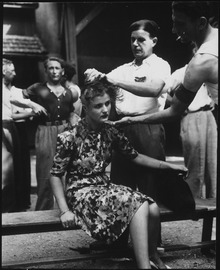Horizontal collaboration

Collaboration horizontale, collaboration féminine or collaboration sentimentale (the French adjective "sentimentale" can be translated as "pertaining to a romantic relationship") was the (supposed) sexual intercourse that some French women had with members of the German invasion force after the Battle of France in 1940. This started to be considered a form of collaboration ca. June 6, 1944, the start of la Libération.
After the War, throughout France, women accused of collaboration were shaved bald.[1] In many of the ca. 20.000 cases, the women in question had only performed professional services for the occupying Germans, rather than being engaged in sexual relationships with them.[2]
"Collaboration horizontale" is believed to have produced 200,000 French babies with German fathers.[3] Since 2009, Germany offers these children of "the other bank of the Rhine" citizenship, after French foreign minister Bernard Kouchner had lobbied for their recognition.[4]
Depictions in film
In Hiroshima mon amour, the (unnamed) female protagonist is revealed to have been shaven as punishment for collaboration horizontale. This phenomenon has also inspired the 2010 film Collaboration horizontale.[5]
References
- ^ Fabrice Virgili (1995). "Les "tondues" à la Libération :le corps des femmes, enjeu d'une réaproppriation". Clio. Femmes, Genre, Histoire.
- ^ Marc Bergère (September 2004). "Tous les milieux sociaux ont été visés". Historia (693). Paris: 56–60.
- ^ Shapin, Stephen (20 September 2013). "Book Review: 'Brave Genius' by Sean B. Carroll". Wall Street Journal.
- ^ "Les "enfants de la guerre" reconnus par Berlin". Libération. 20 February 2009.
- ^ "Collaboration horizontale". IMDB.
